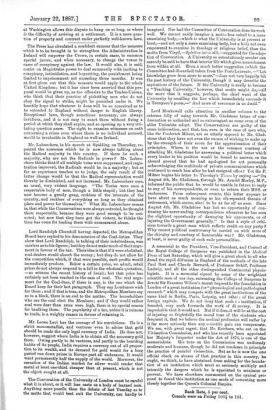Lord Monkswell calls attention in another column to the extreme
folly of using towards Mr. Gladstone terms of con- demnation so unlimited and so extravagant as some even of the abler Unionists adopt. The Conservatives are guilty of the same indiscretion, and that, too, even in the case of men who, like Sir Frederick Milner, are so utterly opposed to Mr. Glad- stone that they have not even the excuse of wishing to make up by the strength of their scorn for the approximation of their principles. Where is the use or the oommon courtesy of attaokiog Mr. Gladstone for answering a political letter which every leader in his position would be bound to answer, on the absurd ground that he had apologised for not personally acknowledging the multitude of private communications which continued to reach him after he had resigned office ? Yet Sir F. Milner begins his letter to Tuesday's Times by saying :—" On August 4th, Mr. Gladstone, through Mr. Arnold Morley, M.P., informed the public that he would be unable in future to reply to any of his correspondents, or even to return their MSS. or enclosures. From subsequent events, this letter appears to have about as much meaning as his oft-repeated threats of retirement, which seems, alas! to be as far off as ever. Since August 4th, Mr. Gladstone has lost no opportunity of con- tinuing his never-ending correspondence whenever he has seen the slightest opportunity of damaging his opponents, or of injuring the Government generally." Is that a style of criti- cism towards a great man which reflects credit on any party ? Why cannot political controversy be carried on with more of the chivalry and courtesy of honourable war ? Mr. Gladstone, at least, is never guilty of such rude personalities.


































 Previous page
Previous page